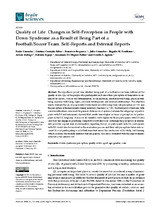Quality of Life: Changes in Self-Perception in People with Down Syndrome as a Result of Being Part of a Football/Soccer Team. Self-Reports and External Reports
Autor
Camacho, Rocío
Castejón Riber, Cristina
Requena Domenech, Francisco
Camacho, J.
Escribano, Begoña M.
Gallego, Arturo
Espejo, Roberto
Miguel-Rubio, Amaranta de
Agüera, Estrella I.
Editor
MDPIFecha
2021Materia
Down syndromePerception
Quality of life
Sport
Age
Gender
Scale
METS:
Mostrar el registro METSPREMIS:
Mostrar el registro PREMISMetadatos
Mostrar el registro completo del ítemResumen
The hypothesis posed was whether being part of a football/soccer team influenced the quality of life (QL) of the people who participated in it since their perception of themselves is enhanced by factors, such as self-determination, social inclusion, emotional well-being, physical well-being, material well-being, rights, personal development, and internal relationships. The objective was to evaluate the QL of people with Down Syndrome (DS) using their self-perception (n = 39) and the perception of the informants (family members, teachers) (n = 39). The KidsLife-Down Scale, with a few modifications, was used. In general, differences of opinion between the subgroups of participants with DS and informants showed that results were higher in terms of perception for participants in the DS subgroup. Scores for all variables were higher for those participants with DS who said they did engage in practicing competitive football/soccer. Although the perception of informants provides a great deal of information regarding the QL of participants with DS, participants with DS should also be involved in the evaluation process and their self-perceptions taken into account. It is not participating in a football team that causes the conclusions of the study, but training (which includes the friendly matches that are played), the cause correlated with the improvements detected in the athlete’s DS.

